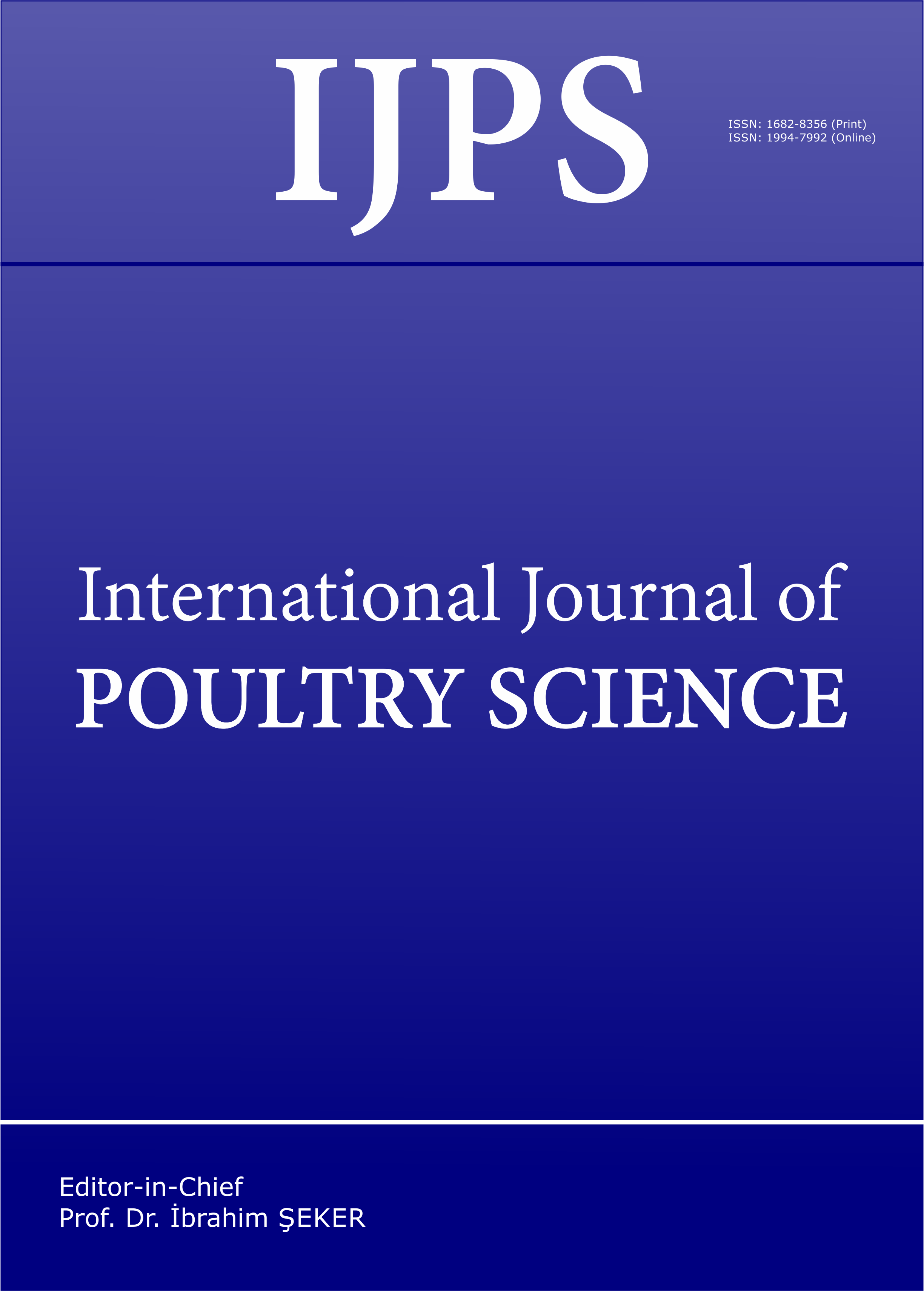Effects of Food Restriction on Rearing Performance and Welfare of a Slow-Growing Chicken Breed: a Behavioural Approach
DOI:
https://doi.org/10.3923/ijps.2009.684.688Keywords:
Behaviour, food restriction, slow-growing chicken breeds, welfareAbstract
The purpose of this experiment was to investigate production and welfare implications of food restriction during the rearing period of a slow-growing chicken. Ninety-four as-hatched day-old Ardennaise chicks were raised up to two weeks of age and were then allocated to two treatment groups: Ad libitum Feeding (AL) and a Feed Restriction Regime (FR). Body weight, food usage and viability were recorded on a weekly basis from 1-12 weeks of age. Activity and oral behaviours were measured at 8, 9, 10, 11 and 12 weeks of age. Number of birds involved in each of twelve mutually exclusive behavioural categories was recorded. Mean proportion of time spent for each activity was calculated. Significance of effects of treatment, age, time of day and their interactions were measured. At 12 weeks of age, mean body weight was 1117 g (± 189.3 g) (AL) and 1054 g (±187.8 g) (FR). Food usage was 4.16 kg (AL) and 3.43 kg (FR) per bird. Feeding treatment had strong effects on preening (p<0.001), feeder directed activity, litter scratching and pecking floor (p<0.01) and pacing (p<0.05), all activity levels being higher in the FR treatment except for feeder directed activity. Age had strong effects on sitting (p<0.001), standing and litter scratching (p<0.01). Sitting (p<0.01) and litter scratching (p<0.05) varied with treatment-age interaction.
References
Appleby, M.C., B.O. Hughes and G.S. Hogarth, 1989. Behaviour of laying hens in a deep litter house. Br. Poult. Sci., 69: 545-553.
Aviagen, T.M., 2008. Ross 308 parent stock and broiler performance objectives. Ross Breeders. http://www.aviagen.com/.
Blockhuis, H.J., 1986. Feather-pecking in poultry: Its relation with ground pecking. Applied Anim. Behav. Sci., 16: 63-67.
Duncan, I.J.H. and D.G.M. Wood-Gush, 1972. Thwarting of feeding behaviour in the domestic fowl. Anim. Behav., 20: 444-451.
Heck, A., O. Onagbesan, K. Tona, S. Metayer and J. Putterflam et al., 2004. Effects of ad libitum feeding on performance of different strains of broiler breeders. Br. Poult. Sci., 45: 695-703.
Hocking, P.M., D. Waddington, M.A. Walker and A.B. Gilbert, 1987. Ovarian follicular structure of white leghorns fed ad libitum and dwarf and normal broiler breeders fed ad libitum or restricted to point of lay. Br. Poult. Sci., 28: 493-506.
Hocking, P.M., D. Waddington, M.A. Walker and A.B. Gilbert, 1989. Control of the ovarian follicular hierarchy in broiler breeder pullets by food restriction during rearing. Br. Poult. Sci., 30: 161-174.
Hocking, P.M., 1993. Welfare of broiler breeder and layer females subjected to food and water control during rearing: Quantifying the degree of restriction. Br. Poult. Sci., 34: 53-64.
Hocking, P.M., M.H. Maxwell and M.A. Mitchell, 1993. Welfare assessment of broiler breeder and layer females subjected to food restriction and limited access to water during rearing. Br. Poult. Sci., 34: 443-458.
Hocking, P.M., R. Bernard and G.W. Robertson, 2002. Effects of low dietary protein and different allocations of food during rearing and restricted feeding after peak rate of lay on egg production, fertility and hatchability in female broiler breeders. Br. Poult. Sci., 43: 94-103.
Hocking, P.M., V. Zaczek, E.K.M. Jones and M.G. Macleod, 2004. Different sources of fibre may enhance the welfare of female broiler breeders. Br. Poult. Sci., 44: 9-19.
Hugues, B.O. and H.A. Elson, 1977. The use of perches by broilers in floor pens. Br. Poult. Sci., 18: 715-722.
Jones, E.K.M., V. Zaczek, M.G. Macleod and P.M. Hocking, 2004. Genotype, dietary manipulation and food allocation affect indices of welfare in broiler breeders. Br. Poult. Sci., 45: 725-737.
Kostal, L., C.J. Savory and B.O. Hughes, 1992. Diurnal and individual variation in behaviour of restricted-fed broiler breeders. Applied Anim. Behav. Sci., 32: 361-374.
Lariviere, J.M., 1998. Motivational and behavioural responses of growing broiler breeder fowls to quantitative and qualitative food restriction. M.Sc. Thesis, University of Glasgow, SAC, Glasgow, Scotland, UK.
Nielsen, B.L., 2004. Breast blisters in groups of slow-growing broilers in relation to strain and the availability and use of perches. Br. Poult. Sci., 45: 306-315.
Pettit-Riley, R. and I. Estevez, 2001. Effects of density on perching behaviour of broiler chickens. Applied Anim. Behav. Sci., 71: 127-140.
Pettit-Riley, R., I. Estevez and E. Russek-Cohen, 2002. Effects of crowding and access to perches on aggressive behaviour in broiler. Applied Anim. Behav. Sci., 79: 11-25.
Sasso, 2003. Rationnement alimentaire de la poule reproductrice SA 31. Guide D'elevage, Selection Avicole de la Sarthe et du Sud-Ouest, Sabres, France.
Savory, C.J., E. Seawright and A. Watson, 1992. Stereotyped behaviour in broiler breeders in relation to husbandry and opioid receptor blockade. Applied Anim. Behav. Sci., 32: 349-374.
Savory, C.J. and K. Maros, 1993. Influence of degree of food restriction, age and time of day on behaviour of broiler breeder chickens. Behav. Process., 29: 179-189.
Savory, C.J. and J.M. Lariviere, 2000. Effects of qualitative and quantitative food restriction treatments on feeding motivational state and general activity level of growing broiler breeders. Applied Anim. Behav. Sci., 69: 135-147.
Van Niekerk, C.C., K.M. Katanbaf, E.A. Dunnington and P.B. Siegel, 1988. Behaviours of early and late feathering broiler breeder hens reared under different feeding regimes. Arch. Geflugelkunde, 52: 230-234.
Downloads
Published
Issue
Section
License
Copyright (c) 2009 Asian Network for Scientific Information

This work is licensed under a Creative Commons Attribution 4.0 International License.
This is an open access article distributed under the terms of the Creative Commons Attribution License, which permits unrestricted use, distribution and reproduction in any medium, provided the original author and source are credited.

